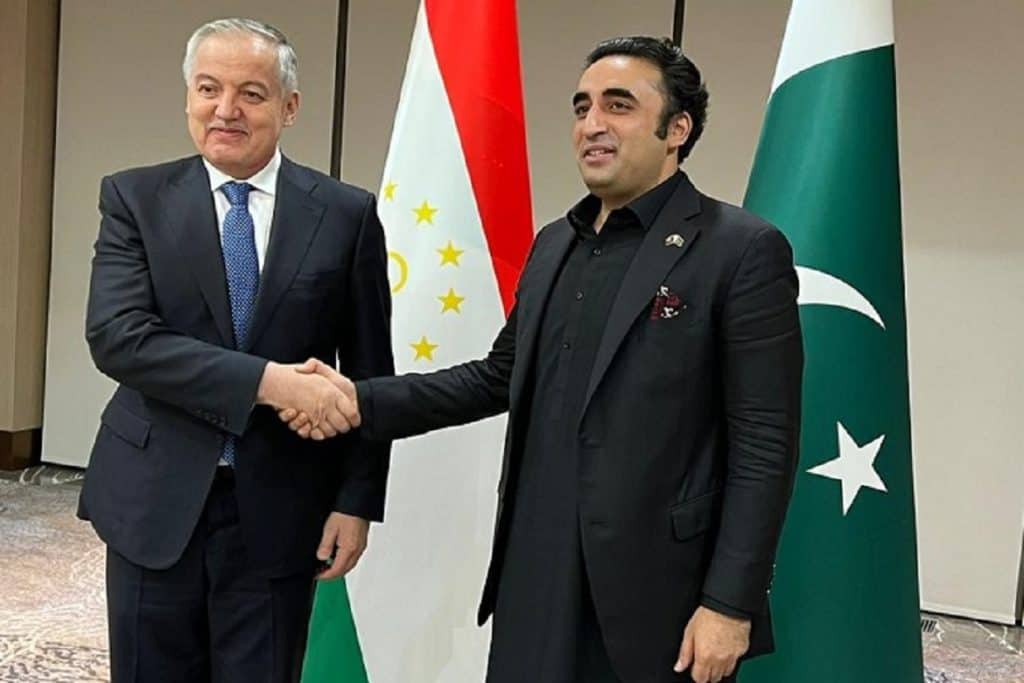“We are always in favor of peace and political stability in our neighboring countries, so we would be able to live with them in an atmosphere of good neighborliness and constructive cooperation” Quotation by the President of the Republic of Tajikistan, Leader of the Nation, H.E. Emomali Rahmon – 21 December 2021, Dushanbe city.
By Mirsaid Rahmonov
The South Asian region consists of the countries of Afghanistan, Bangladesh, Bhutan, Maldives, Nepal, Sri Lanka, India and Pakistan and is located in the southern part of Asia. All countries were under British rule for a long time, and later on through efforts and struggles they gained freedom. In this way, they educated their nation and people to be creative, diligent and built their homeland and state.

In fact, independence and freedom are priceless gifts that every nation strives for in various ways. An important point in the struggle for freedom is to have a wise leader who builds the nation and leaves civilization and education as a valuable investment for them.
Annually Independence Day is celebrated in the second half of August in the land of India and Pakistan. This year, two neighboring countries with common similarities in language and culture are celebrating their 75th anniversary. Thus, Tajikistan also celebrates its independence on September 9 accordingly.
After gaining independence, Tajikistan started its relations with all South Asian countries, including Pakistan.
It is worth mentioning that every year on August 14, 1947, the country of Pakistan celebrates its independence, which was achieved as a result of continuous struggles from British rule.
It should be noted that the British left Pakistan with a weak and unstable economy, after the partition, they divided the region into two independent countries and left most of the factories in the Indian part. In addition, they managed to complicate the issues and situation accordingly.
Pakistan was one of the first to recognize Tajikistan’s independence and at the same time opened its embassy in Dushanbe at the beginning of the year. According to the Ministry of Foreign Affairs of Tajikistan, diplomatic relations between the Republic of Tajikistan and the Islamic Republic of Pakistan were established in June 1992, and they celebrated their 30th anniversary in 2022.
Both countries have their ambassadors. For the first time in 1993, the Islamic Republic of Pakistan opened its official Embassy in the Republic of Tajikistan, and its activities began in early 1994. Lately in 1993 and 1997, the Consulate of the Republic of Tajikistan was opened in Karachi and Islamabad cities.
On February 23, 2005, the Embassy of the Republic of Tajikistan in the Islamic Republic of Pakistan began to operate, and both friendly countries signed more than 50 regulatory and legal documents. The President of the country, Emomali Rahmon, made an official visit to Pakistan for the first time in March 1994, later in 1996, 2002, 2004, 2005, 2009, 2011, 2015, 2017 and 2021, which laid the foundation for new pages in the history of bilateral relations.
According to various sources and the book of the Pakistani writer Professor Muhammad Akhtar (1934-1915), there are more than 1.2 million people of Tajik origin living in Pakistan, most of whom have made this place their permanent homeland since the reign of the Mongol dynasty. It should be noted that most of the ancestors of the Mongol dynasty here were engaged in trade, military, science and knowledge, architecture, religion and mysticism, whose traces have remained to this day.
Pakistan is an agricultural country, and its currency is the Pakistani rupee. Its main exports are oil, leather, clothing, fabric, cotton, rice, food and decorative goods. Its imports are automobile and chemical industry products, transport equipment, fuels and lubricants.
It should be noted that Pakistan, with its conditions and opportunities, has created the shortest and easiest ways to expand trade and economy to all Central Asian countries, including Tajikistan, and is still continuing its efforts in this direction. Tajikistan is also trying to use the port of Gwadar in Pakistan to expand its business relations to all countries of the world. For this good move, both countries should use regional cooperation strategies to overcome obstacles and invite other related countries for regional cooperation to use the natural resources of the region.
The President of Tajikistan concentrates the South Asian region, especially Pakistan very important and strategic Muslim state. It is necessary to have good relations under the policy of “open doors”, considering diplomatic relations between the states friendly, economically and trade.
Tajikistan is one of the most important countries in Central Asia (Tajikistan, Uzbekistan, Kazakhstan, Turkmenistan and Kyrgyzstan), which has natural resources and a large power generation center. At a distance of 28,500 km, 948 rivers pass through this country, which are considered one of the wealth of the country. The country has 8,000 glaciers, the proper use of which can benefit the population of the country and the planet. Tajikistan has 4% of the world’s hydropower capacity and is one of the third largest producers of electricity.
Therefore, the generation of its electric projects is one of the important energy directions of the country and will benefit the entire region, including Pakistan.
The directions that bring Tajikistan and Pakistan closer together is the creation and implementation of the CASA-1000 project, which is initiated and coordinated mainly by Tajikistan, Kyrgyzstan, Afghanistan and Pakistan. It should be noted that the main goal of the CASA-1000 project is the generation and transmission of hydroelectricity from Central Asia to South Asia. According to the sources, this project has 3 sections, which includes the construction of 1,222 km of transmission lines and stations, the creation of technical and financial assistance through joint commissions, and the development and assistance of the people located along the project route. With its implementation, the country of Pakistan will get 1300 megawatts of electricity, and with this means, it will get rid of the crisis of energy consumption to a sufficient extent.
In addition, Tajikistan and Pakistan can develop and strengthen their cooperation in the field of agriculture and industry. Because both countries have wide and good agricultural and industrial resources, which include potato, cotton, rice, fruit, match making, cement, clothing, tube making, etc. Tajikistan can use the experience and industry of Pakistan in the processing of food, wool, paper and textiles. Because this country occupies the third place in the world in the production and processing of cotton products.
To date, with the establishment of diplomatic relations, more than 50 private Pakistani companies and entrepreneurs are operating in the Republic of Tajikistan. According to statistics, in the last ten years, the trade exchange between the two countries has reached more than 50 million dollars, and the parties are trying to increase it to 500 million dollars in the near future.
The country of Pakistan is on a geostrategic route, it can play a key role as a geopolitical orbit in Asia, and it is constantly trying to include itself in the ranks of the 25 largest economic countries in the world.
It is good to mention that Urdu and Hindi languages are taught at National University of Tajikistan. There is also a Pakistani learning center, which helps the students, the researchers promote the educational and cultural relations between the two countries.
In this context, for further strengthening and scientific and literary exchange, the National Academy of Sciences of the Republic of Tajikistan allocated a department to the countries of South Asia in the the Institute for the Study of Issues of Eurasian States indicating the importance of strategic cooperation in the region.
In addition, the Tajik-Pakistan Friendship Society is active as a public diplomacy for the strengthening of literature and culture, politics and travel.
Accordingly, the correspondence, writings and literary relations of Tajikistan poets and writers such as Mirza Tursunzoda(1911-1977), Sotim Ulughzoda (1911-1997), Mirsaid Mirshakar (1912-1993) with the writers of South Asian region, especially Paklistan as Muhammad Iqbal (1877-1938), Hafiz Jolandhari (1900-1982), Faiz Ahmad Faiz (1911-1984) Hasan Doni and Nadim Qasimi (1916-2006) are considered by Tajik and Pakistani intellectuals as luminaries of the path of science and literature and use their creativity.
In conclusion, we can summarize the diplomatic relations between Tajikistan and Pakistan with important and suggest the following points for close cooperation and coordination accordingly:
– Creation and strengthening of transport and trade relations between the two countries
– Expanding and strengthening the development of economy, industry and travel
– Strengthening and expansion of cooperation in the field of oil and gas processing and natural minerals
– Establishment of joint ventures for the processing of various products
– Preparation of industry specialists with joint professional development courses
– Use of experiences and training courses of the diplomatic academy of Pakistan
– Establishment of cooperation and scientific exchange between the Institute of Asia and Europe of Tajikistan with the research centers, Institutes and Universities of Pakistan
– Cooperation to prevent terrorism, extremism and public illiteracy
– Cooperation to create peace and stability in the region, especially neighboring Afghanistan
– Expansion of cooperation within the framework of regional and global organizations
– Creation of air routes between the cities of Dushanbe, Lahore and Karachi
In summary, the people of both countries have long-standing political, economic, literary, linguistic, cultural ties in the light of UN, ECO,CICA, SCO organization and the implementation of the above recommendations within the framework of the signed agreements, can play an important and fundamental role in the development and expansion of cooperation in the spheres of economy, culture, tourism, energy and industrialization.
Author: Mirsaid Rahmonov – Senior researcher at the South-East Asia Department Institute of Asian and European Studies, Nationa Academy of Sciences of Tajikistan
(The views expressed in this article belong only to the author and do not necessarily reflect the views of World Geostrategic Insights).







